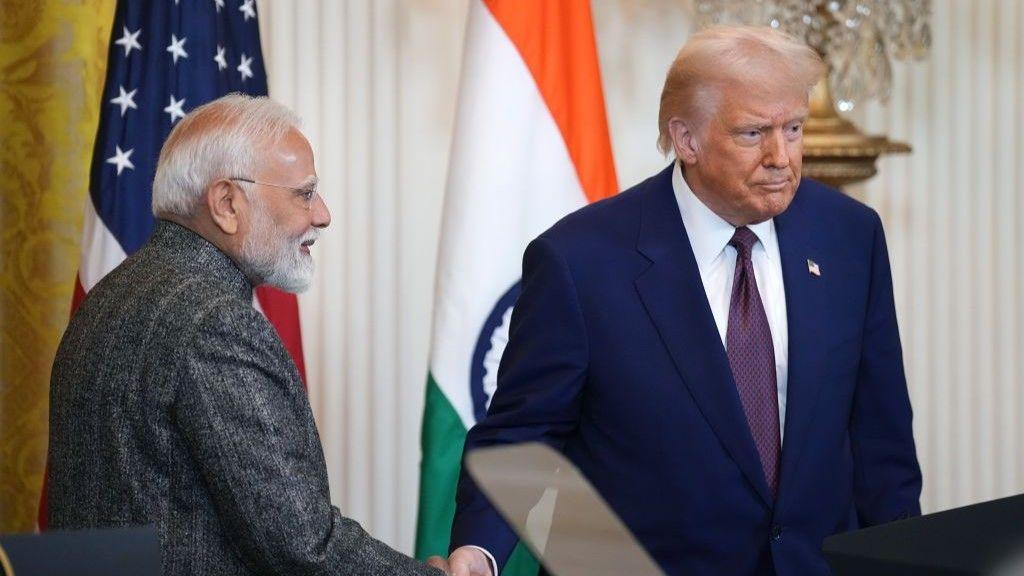“`html
US President Donald Trump has issued an executive order imposing a 25% tariff on India’s imports of Russian oil.
This measure will elevate the total tariff on Indian goods entering the United States to 50%, placing it among the highest rates levied by the US.
According to the executive order, the new tariff will take effect in 21 days, specifically on August 27th.
In response, India’s foreign ministry stated Wednesday that Delhi has consistently articulated its position on imports from Russia, reiterating that the tariff is “unfair, unjustified and unreasonable.”
“It is therefore extremely unfortunate that the US should choose to impose additional tariffs on India for actions that several other countries are also taking in their own national interest,” the statement read.
The statement concluded, “India will take all actions necessary to protect its national interests.”
President Trump previously warned of increased levies, asserting that India does not “care how many people in Ukraine are being killed by the Russian War Machine.”
The White House released a statement Wednesday declaring that the “Russian Federation’s actions in Ukraine pose an ongoing threat to US national security and foreign policy, necessitating stronger measures to address the national emergency.”
The administration contends that India’s imports of Russian oil undermine US efforts to counter Russia’s activities in Ukraine.
The US intends to assess oil imports from Russia by other nations and “recommend further actions to the President as needed.”
Oil and gas constitute Russia’s largest exports, with China, India, and Turkey among its primary customers.
The threatened tariff increase follows meetings in Moscow on Wednesday involving Steve Witkoff, Trump’s top envoy, focused on securing peace between Russia and Ukraine.
Delhi had previously deemed Trump’s threat to raise tariffs over its purchase of Russian oil as “unjustified and unreasonable.”
Earlier, Randhir Jaiswal, a spokesperson for India’s foreign ministry, stated that the US had encouraged India to import Russian gas at the conflict’s outset to “strengthen global energy markets stability.”
He explained that India “began importing from Russia because traditional supplies were diverted to Europe after the outbreak of the conflict.”
This tariff threat underscores Trump’s willingness to impose sanctions related to the war in Ukraine, even against nations the US considers important allies or trading partners.
This action could serve as a warning, suggesting that other countries might face significant repercussions if Trump escalates sanctions after Friday’s deadline, when he has threatened new sanctions on Russia and 100% tariffs on countries purchasing its oil.
This would not represent the first instance of the Trump administration imposing secondary tariffs, which are currently in place to penalize buyers of Venezuelan oil.
India has previously criticized the US – its largest trading partner – for introducing these levies, given that the US itself continues to trade with Russia.
Last year, the US engaged in an estimated $3.5 billion (£2.6 billion) worth of trade with Russia, despite existing sanctions and tariffs.
Trump and Indian Prime Minister Narendra Modi have previously referred to each other as friends and, during Trump’s first term, participated in political rallies in each other’s countries.
However, this has not prevented Trump from imposing levies on India, suggesting divergent interests between New Delhi and Washington.
The tariffs are projected to significantly increase the cost of Indian goods in the US, potentially reducing US-bound exports by 40–50%, according to the Global Trade Research Initiative (GTRI), a Delhi-based think tank.
“India should remain calm, avoid retaliation for at least six months, and recognise that meaningful trade negotiations with the US cannot proceed under threats or mistrust,” stated Ajay Srivastava, former Indian trade official and head of GTRI.
With additional analysis from BBC North America correspondent Anthony Zurcher and BBC India correspondent Soutik Biswas.
It remains unclear how many people have been shot or injured in the shooting at Fort Stewart military base.
The US is withdrawing $500m for vaccines for diseases like flu and Covid. Health correspondent James Gallagher asks if it’s the right call.
The Seattle Kraken mascot, who was filming a promotional video with team forward John Hayden, safely escaped the encounter.
The 12-month pilot programme targeting Malawi and Zambia aims to curb visa overstays, the US says.
Shatta Wale criticises the authorities the seizure of his car and says he is unaware of its link to crime.
“`

